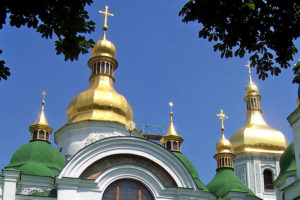JRL NEWSWATCH: “Spiritual capital: why Ukraine is breaking from Russia’s Orthodox Church; The Ukrainian government has promised its citizens a new, independent Orthodox Church that will unite Ukrainian believers. But bringing several denominations together is harder than you think. [Excerpt]” – OpenDemocracy/Andrii Fert

(opendemocracy.net – Andrii Fert – September 17, 2018)
Andrii Fert researches state-church relations in the late Soviet Union. He is a graduate student at Kyiv Mohyla Academy, and works for DVV International.
“Over the last few months, the lexicon of many Ukrainians has been enriched by two new words: ‘Tomos’ and ‘autocephaly.’ These words, whose literal meanings are ‘religious decree’ and ‘religious autonomy,’ have been all over the newspapers, social media and TV screens. In April this year, Ukraine’s president and parliament asked the Patriarch of Constantinople, the highest arbitrator in the Orthodox world, to recognise the canonical independence of the Ukrainian Orthodox Church.
Religion, a subject that the media normally ignore outside Christmas and Easter, has dominated headlines and public debate ever since. And all because for many, the Tomos is a kind of declaration of Ukrainian independence – not so much religious independence, but political.
Indeed, President Petro Poroshenko has stressed the political nature of this independence. Speaking on television recently, he declared that ‘this isn’t a religious matter. It isn’t simply a matter of state either. It’s a historic event, when Ukraine’s own church will return home after hundreds of years.’ Other public and political figures have echoed his sentiments. Vitaliy Deynega, a prominent activist on Ukraine’s frontline, posted this declaration on Facebook: ‘Many generations have fought for the independence of our country, including its spiritual independence… It’s important to free the hearts and minds of Ukrainian believers from the influence of [the Russian occupiers].’
But a closer look at the situation shows that it is less a matter of ‘freedom from influence’ or the unification of several denominations. Rather, this is about the creation of symbolic capital that will give Ukraine’s political elite an advantage ahead of next year’s elections….
In the circumstances, however, this united church is very unlikely to be genuinely united. Practising believers, who mostly belong to the Moscow Patriarchate, will not join it. This will be for various reasons: their conservatism, their conception of the unity of the Russian Church and their reputation in the eyes of the public. In this sense, the united national church – if it receives its Tomos – will be merely a symbolic victory for Ukraine’s patriotic ‘church passers-by.'”
Click here for: “Spiritual capital: why Ukraine is breaking from Russia’s Orthodox Church; The Ukrainian government has promised its citizens a new, independent Orthodox Church that will unite Ukrainian believers. But bringing several denominations together is harder than you think. [Excerpt]” – OpenDemocracy/Andrii Fert
Full article appeared at opendemocracy.net/od-russia/andrii-fert/spiritual-capital-ukraine-orthodox-church bearing the following notice:
 This article is published under a Creative Commons Attribution-NonCommercial 4.0 licence. If you have any queries about republishing please contact us. Please check individual images for licensing details.
This article is published under a Creative Commons Attribution-NonCommercial 4.0 licence. If you have any queries about republishing please contact us. Please check individual images for licensing details.
[featured image is file photo]
